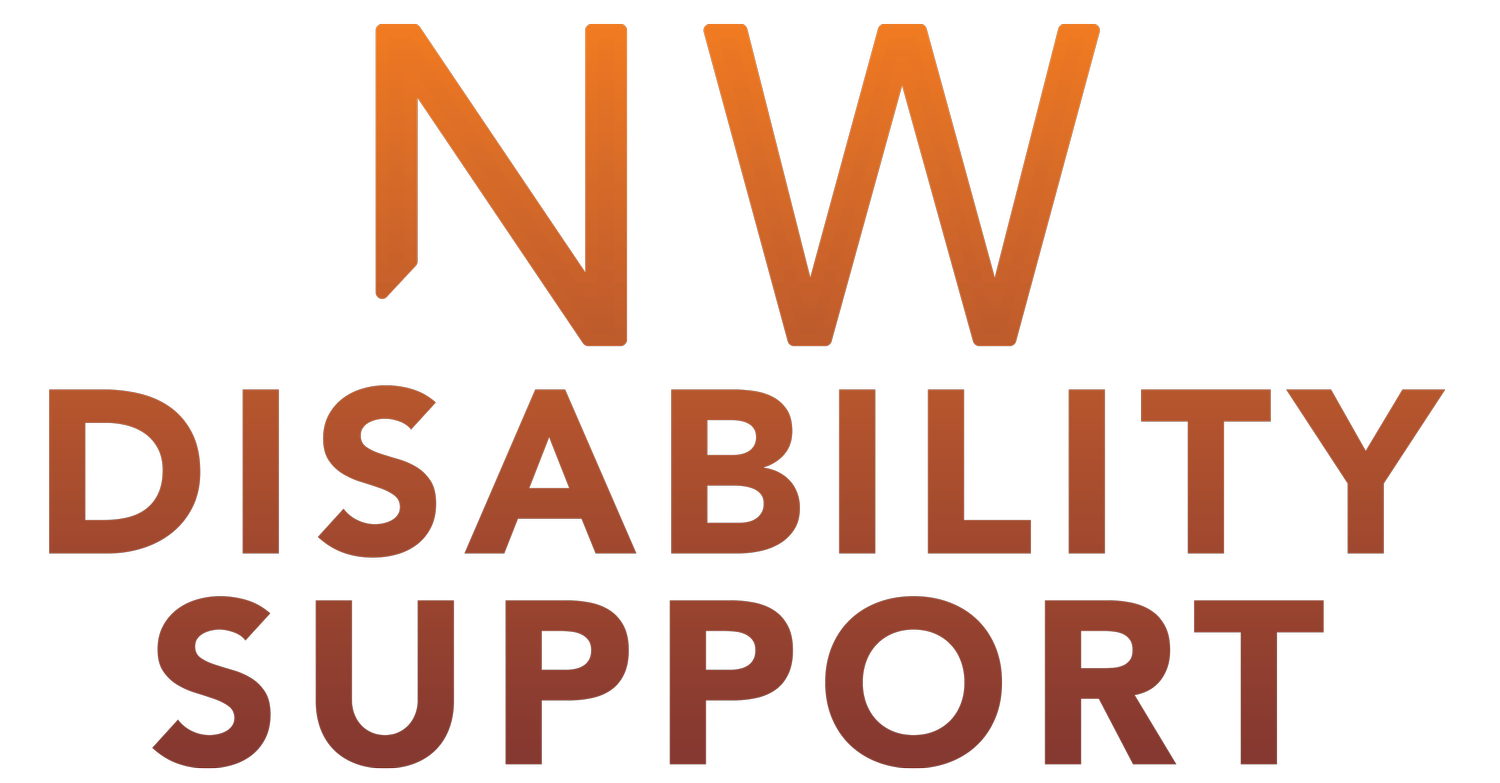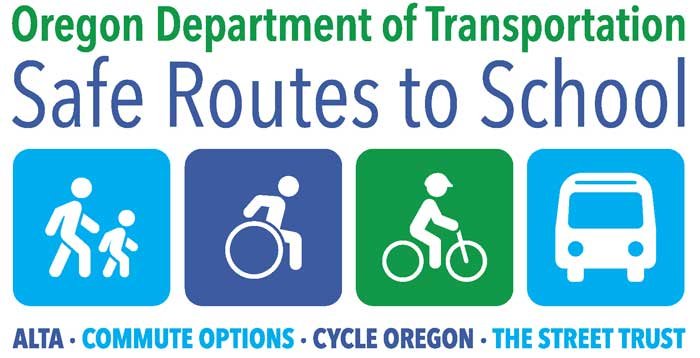In the news
We love to see Bike First! in the news. Please send news stories
to annbikefirst@gmail.com.
“Portrait of Inclusion” from Portraits of Alameda
by Gail Jeidy
“Ann Donaca: Let’s talk about inclusion”
Ann Donaca grew up in Lake Oswego but has lived in the Alameda/Beaumont neighborhood for 31 years. I wasn’t surprised to learn she was a cheerleader in high school. She brings energy and enthusiasm to the room, an asset for her career as an elementary school teacher, then professor (teacher of teachers) at Portland State and Concordia Universities, and finally vice principal at an elementary school in a nearby district.
My friend group was very broad in high school; I wanted everyone to feel included. And then with teaching, I was always the teacher who had kids with trauma, or poverty, or behavioral things or disabilities placed in my general classroom before there were supports. Ann raised two kids in the neighborhood. Her daughter, Bobbi, is an educator and an artist. Her son, Cody, is an equity ambassador, a football coach, and a friend to many. In 2018, he also became the first Oregon student with Down syndrome to graduate college. May of his senior year, he came home, and he said, “where am I going to college, Mom?” And I said, “Oh, guess what? People like you, Cody, who have disabilities like Down syndrome, there’s nowhere for you to go in Oregon.” And then I started thinking, well, I work at Concordia University, so I went to talk with the Dean…
Ann officially retired from her vice-principal role last summer. Shortly after this interview, she had two yards of topsoil delivered to her yard. She dispersed it within a day (with Cody’s help). She loves making things grow, nurturing different levels of plants, and carving pathways. Gardening is a fitting metaphor for her lifework. My number one job now is as an advocate. And then it is running Bike First!, our week-long summer bike clinic, where we teach children, youth, and some adults with disabilities the skills needed to ride typical two-wheeler bikes. This is our 20th year.
We want kids with disabilities to have healthy, robust lives, be included in riding with their friends, and ride with their families. We also want to make systemic change, so kids and adults are not afraid of people with disabilities, and they are inviting them to their birthday parties, having them over to watch a football game.
We have breaks in between sessions, and we talk. What are you feeling? What are you learning? What are you sharing at your dinner table at night when you go home with your family? We have a lot of volunteers. We also have seven people on staff with disabilities, the majority of whom learned how to ride at Bike First!. We want people with disabilities in paid positions because it can be very difficult to find jobs. It’s important that they are seen, valued, give back, get paid, and are an integral part of the staff. Your leadership-by-example has had a ripple effect throughout Alameda and
beyond. I credit you as introducing me to the beauty of
“inclusivity.”
That’s what we've always been about. Cody loves his birthday parties, which are always inclusive. If Mattie was in town and Mattie wanted to come Mattie can come and Mattie can bring five friends who don’t know Cody because by the time they leave, they will know him and they will take steps towards acceptance of people with disabilities.
Each new school year, Ann introduced Cody to his classmates by sharing a stack of 8” by 10” photographs of him doing a variety of activities – at a baseball game, losing a tooth, riding a horse, eating ice cream – followed by a question: “Have you guys done that before?” The kids would then discuss what they had in common. She closed with a picture of his 23 chromosomes.
And I would have them count the two in each pair, except for number 21, there are three. That’s it. The only thing Cody has different.
So, how do you treat a friend? Let’s educate kids when they are little. Let’s talk about it. Let’s be inclusive. When I present to adults, one of the things I’ll ask is, “Any of you ever have somebody in your life with a lifelong disability? How about when you were growing up? Did you ever have them over for dinner? Did you ever have them at your birthday party? Did you ever play date?”
Very few say yes. So, once again, it’s how do you make systemic change? Well, you’ve got to talk about it. You’ve got to be open about it. Over the years, Ann listened to her son and then figured out a way to support his next steps, whether it was getting a cellphone (she eventually said yes), walking to middle school (she’d drive him past the school each day so he could meet up with a supportive group of friends who walked), driving a car (he got his chance on a three mph drive on the beach, radio blaring), getting a debit card (before, they set up tabs for him with the aid of neighborhood businesses.)
I think by Cody being so warm, so loving, so fun, it probably helped break down a lot of barriers. Also, it’s that spirit of community that the Alameda area has that’s been so beautiful because people have embraced him and have wanted to know him…The entire community is Cody’s family. It’s why we are still here. He has his bus lines. He will see teachers at Beaumont who are still there. He has Alameda and Grant. Cody can be riding his bike down the street and people know who he is.
Ann and Cody sat in aisle seats in the second row when President Biden came to town in 2022. After his speech, Biden, surrounded by Secret Service, immediately saw Cody’s handprinted sign and stopped to chat. When Cody gushed, “I love you Mr. President,” Biden gave him a hug. The heartfelt gesture wasn’t an orchestrated moment, but it was picture-perfect.
Jump Start
Adaptive Bike Education Guide
Regardless of ability, all students deserve the opportunity to participate with their peers, be outside, and feel the wind on their faces. Adaptive mobility equipment enables students with different needs to participate in learning to ride safely. Each person and disability is unique, and bikes and trikes can be customized to meet their needs. This guide to adaptive bike education provides an overview of strategies, equipment, and lesson modifications for including students with disabilities and varying needs in learn-to-ride and bike safety lessons.
Oregon Outdoor Recreation Summit: “Bike First! Inclusion
through Community Programming”
https://www.oregontrailscoalition.org/summit
December 5-7, 2024
Floor Director Emma Flynn and Leader and Asst. Safety Coordinator Owen McLafferty presented Bike First! Inclusion through Community Programming during the Oregon Outdoor Recreation Community Updates Plenary and Office Hours portion of the Oregon Outdoor Recreation Summit in Bend, Oregon. They emphasized the importance of inclusion of people with disabilities by sharing how Bike First! focuses on rider safety and building confidence and independence.
The conference had many other presenters and organizations in attendance to discuss inclusion in their programs. The Bike First! team had the opportunity to connect with other recreation organizations, advocates, and supporters to continue teaching the importance of inclusion for all.

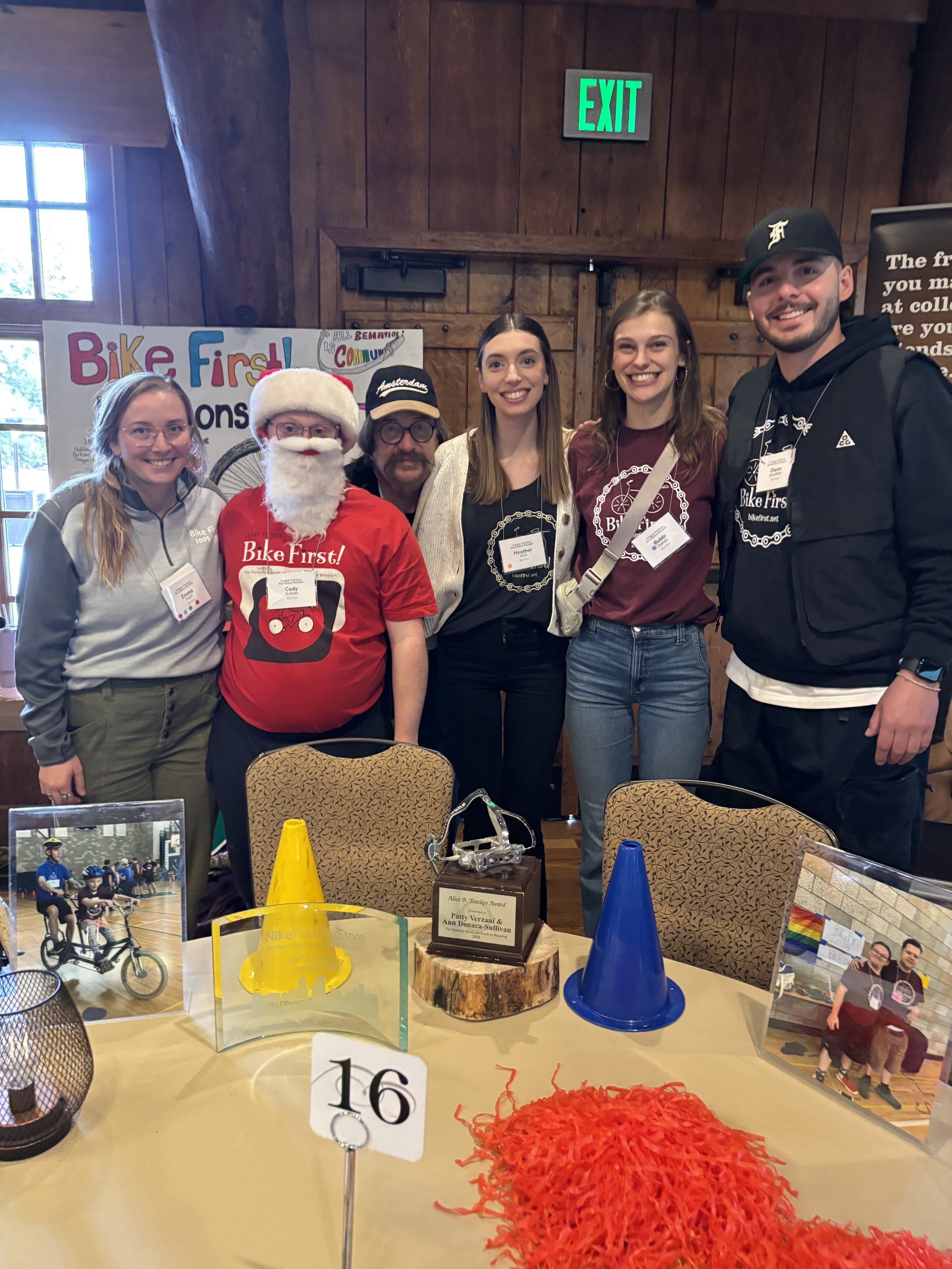

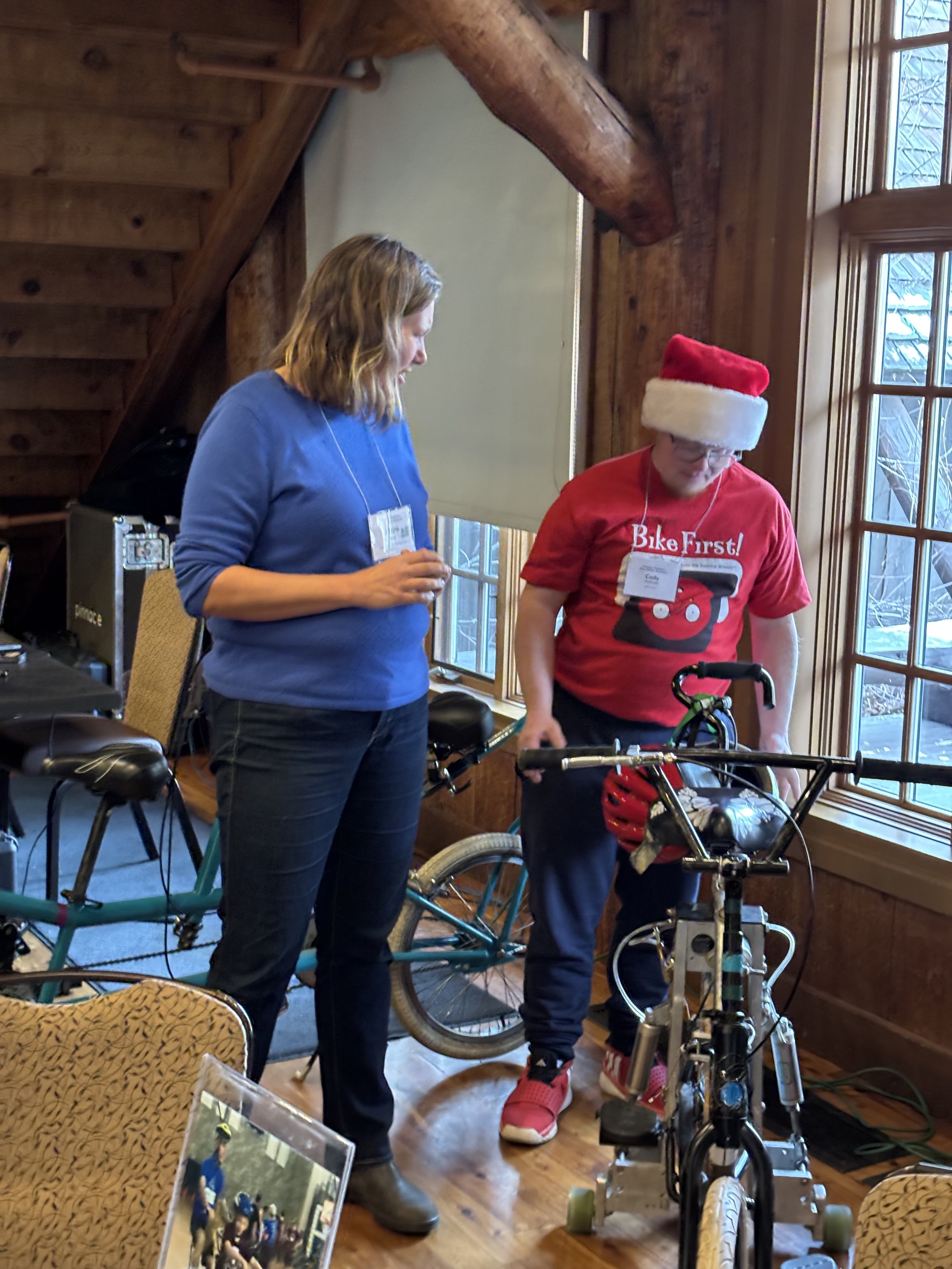
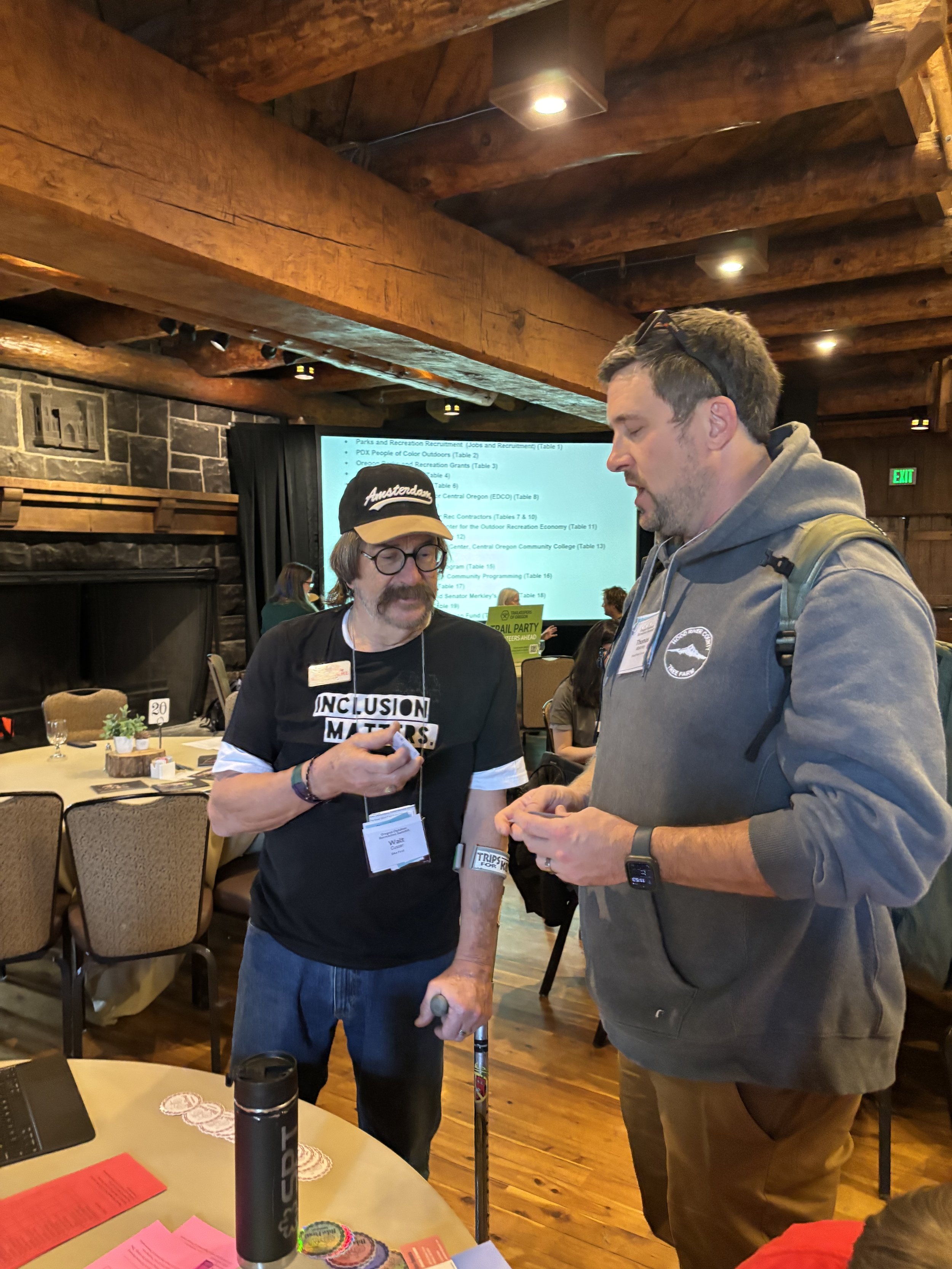
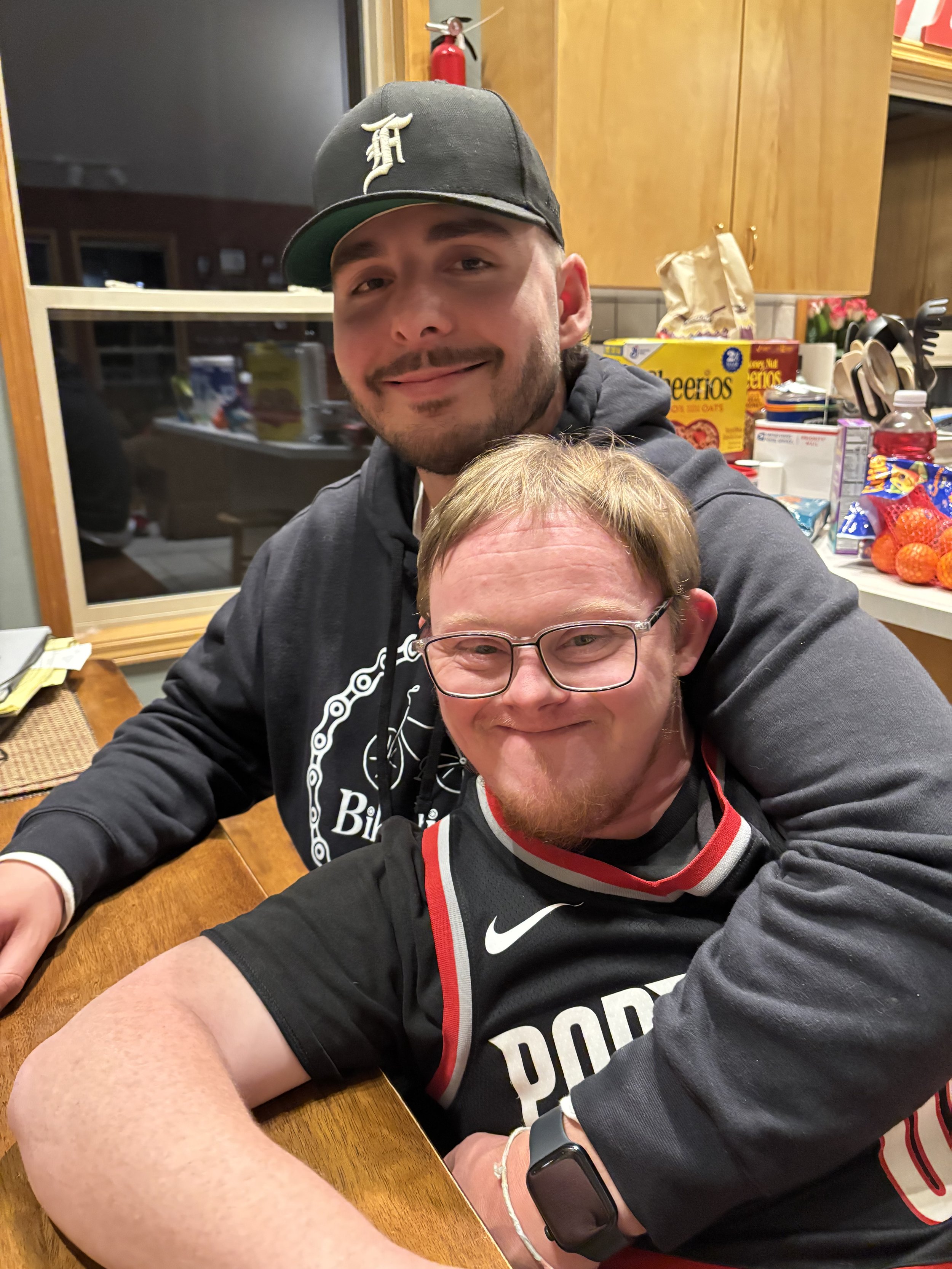
Including Students with Disabilities in Safe Routes to School Activities
https://www.oregonsaferoutes.org/including-students-with-disabilities-in-srts-activities/
Students with disabilities should be included in SRTS activities. There are countless benefits of participating in SRTS activities, including mental and physical. Please see below for some benefits, recommendations, and learning opportunities.
Benefits:
Learning bike and/or pedestrian safety
Understanding transportation options
Building confidence and a sense of independence
Empowering students
Contributing to social skills development
Recommendations:
Create SRTS materials that recognize students with disabilities.
Include pictures of students with disabilities in program messaging to highlight that SRTS programs are suitable for all students.
Reach out to parents and caregivers of students with disabilities to understand their specific needs and to collect input on the SRTS program.
Invite all students to participate in SRTS events and activities.
Before an event: Provide clear and easy-to-understand information on what to anticipate, how to engage, and explain the process of the activity.
Talk about disabilities in a thoughtful way to normalize the different ways people can be pedestrians or bicyclists.
Share the honest limitations the SRTS team may have in including students of all abilities while being open to creative and unexplored ideas from the school staff, parents, educators, etc.
–San Mateo County SRTS March Newsletter
Learning Opportunities:
Attend the SRTS National Partnership May 15th webinar from 11-12 pm on Engaging and Including Students with Disabilities in Safe Routes Programs.
Read the SRTS National Partnership write-up on Engaging Students with Disabilities in SRTS.
Thank you to Ann Donaca, Founder and Director of Bike First!, for the fantastic photos.
National Safe Routes to School: Bike First! Presentation
”Engaging and Including Students with Disabilities in Safe Routes Programs”
Walk, Ride, and Roll Webinar Series, May 15, 2024
Giving kids a first on two wheels
By Liz Blodgett, News Editor
March 19, 2019
Bike riding is among the many childhood stepping stones most people have taken. However, many adults, teens, and children with disabilities don’t know how to ride a bike or even have the skills to. Bike First is a way that these individuals can learn the skills to ride a bike.
Ann Donaca started this program in 2007 when her son, Cody Sullivan, wanted to ride his bike with his friends. Realizing that typical bike riding methods wouldn’t teach Cody to ride a bike, Ann found adapted bikes that helped teach them the skills needed to ride a typical bike. Since then, Bike First has grown to where it is today. Each year, the program allows many children with various disabilities with the ability to ride a two-wheel bike by the end of the week.
“Bike First! opens eyes to the importance of providing healthy, robust lives for everyone,” Donaca said.
Each of the volunteers gets to experience Bike First! in different ways. Some volunteers are running behind the rider, ensuring they are stable and biking at a safe pace. Others run in front of the rider to keep them engaged and show them where to ride. Others are on the sidelines cheering on the riders as they pass by.
Clackamas Community College student Noah Kurzenhauser has volunteered at Bike First! for four years.
“At the end of the day, it boils down to ‘inclusion’”, Kurzenhauser said. “So often, the kids want to learn so they can bike with their friends during summer break without training wheels or join their family on bike rides. It’s the concept of normalcy, really,”
Read Full Article
Learning to ride a bike builds confidence for disabled kids
Mason couldn’t seem to get the hang of riding a bike.
“He was using training wheels, and every time I raised them, he wouldn’t ride,” said his father, Jeff Frenzel.
Frenzel heard about a program in Portland called Bike First! that helps kids with Down syndrome, like 15-year-old Mason, learn how to ride. Father and son traveled from Albany and lived in a hotel during the week-long clinic at Concordia University in Northeast Portland last week. On the first day, Mason did really well. Tuesday was not so good, but by Wednesday, he was up on two wheels. “Tears were flowing down my cheeks,” Frenzel said.
And by Friday, Mason was wheeling around the former tennis court outside the gymnasium like he’d been riding for years. The Bike First! program was launched six years ago by Concordia Professor Ann Donaca to help her son, who has Down syndrome.
“Cody was ten years old and weighed 100 pounds,” Donaca said. “He wanted to ride, but he couldn’t do it.”
She read an article about an organization called Lose the Training Wheels, a Pennsylvania-based nonprofit devoted to helping kids with disabilities ride bikes. “I couldn’t bring Cody to the camp, so I brought the camp here,” Donaca said. She formed a Portland affiliate and attracted sponsors such as River City Bicycles and Multnomah Athletic Foundation.
The camp is always held the first week after school lets out. Volunteers, many from local high schools or recent graduates, work with the kids. Each session includes eight students and goes for 75 minutes. With five sessions a day, that works out to about 240 kids since 2006.
“We have a 97 percent success rate,” said Hillary Dodge, a 16-year-old Grant High School junior volunteering at the camp for five years. “Kids with autism or Down syndrome have balance problems,” Dodge said. “What takes a typical kid two hours, they take a week.”
But they get there with special bikes and a lot of support and encouragement. “It’s impressive what kids can do,” said Elliot Vaughn, a recent Wilson High School graduate.
Bike First! cyclists take summer for a spin during Bike First! 2015
It was a week of triumph and achievement for the 52 aspiring cyclists enrolled in Bike First! and Quick Start! / Refresher Clinics. Bike First! week-long camp brought smiles to the faces of the riders, volunteers, parents, and guardians alike. Cyclists of all ages and abilities made excellent progress in developing the skills needed to ride typical two-wheeler bicycles.
The spirit of the community and inclusion rang loudly throughout the week as 45 outstanding volunteers contributed their time, energy, and compassion.
Thank you to Original Joes and Boomers BBQ for lunch each day (they’ve been with us for eight years!), Concordia University for donating the use of the gymnasium (eight years!), Multnomah Athletic Foundation (eight years!) and Safe Routes to Schools (seven years!).
Read more at www.cu-portland.edu/about/life-fast-lane
